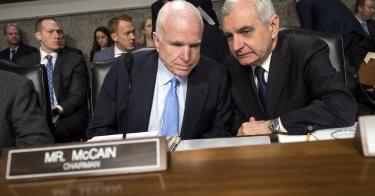For the past 12 years, Congress has resisted calls from the Department of Defense to authorize another round of base realignment and closures.
A new round is needed and is the best way for the Pentagon to objectively evaluate its infrastructure and shed capacity it no longer needs.
Base realignment and closures have emerged as a sensitive topic for lawmakers in Congress in discussions about the 2018 National Defense Authorization Act.
Closing unneeded military infrastructure is a politically unattractive position for many politicians, since it would involve displacement of jobs associated with military installations in their districts. But in reality, the net loss of displaced jobs is small.
Instead, members of Congress should focus on the savings and opportunities that can be realized with a future round of base realignment and closures.
Other members of Congress are skeptical of a new round because the round of base closings that occurred in 2005 produced fewer savings and higher costs than advertised.
Their concerns are valid and underscore why Congress should reform portions of the base realignment and closure process when authorizing a new round of closures.
>>> To Maximize Defense Funds, Congress Should Look at Closing and Realigning Military Bases
Sens. John McCain, R-Ariz., and Jack Reed, D-R.I., have proposed an amendment to the National Defense Authorization Act that would address most of these issues. The amendment would implement a modified base realignment and closure procedure that introduces important reforms and greater congressional involvement in the process.
The proposed amendment mandates that all base realignment and closure recommendations achieve a net savings within 10 years and establishes targets for reducing excess capacity.
These targeted reductions would reassure members of Congress that the new process would be focused on generating savings.
Under the McCain-Reed proposal, the force needed to protect America and its interests would determine the recommendations for which bases to close or realign, with the requisite force structure based on McCain’s “Restoring American Power” proposal that recommends a much larger military.
This approach would assure lawmakers and constituents that a future round of base realignment and closures would account for emerging threats to our country and not some arbitrary political calculus.
As a safeguard against the cost overruns of the 2005 round, the McCain-Reed amendment would reform the cost estimation process and cap the total implementation costs at $5 billion dollars.
Despite these positive improvements, the McCain-Reed amendment faces two pitfalls—the removal of the Base Realignment and Closure Commission, and the requirement to have an affirmative vote for the recommendation list to become binding.
In previous base realignment and closure rounds, the commission played an essential role as an impartial arbiter that evaluated the Pentagon’s recommendations and reviewed analysis from the Government Accountability Office.
This provided political cover for members of Congress because the commission recommended a list on which Congress as a whole would cast a single up-or-down vote, allowing individual members in specific districts to protect a local base by voting “no” while still gaining sufficient “yes” votes from all the other members to pass the legislation.
The commission used the Government Accountability Office’s review to assess the list of recommendations to ensure that facilities recommended by the Pentagon met the criteria established by the authorizing legislation and it provided a forum for affected communities to voice their position for or against the Pentagon’s recommendations.
The current base realignment and closure legislation would give Congress 45 days to reject the commission’s recommendations list by passing a joint resolution of disapproval. Otherwise, the recommendations become binding.
>>> House’s Refusal to Reassess Military Bases Will Lead to Unnecessary Costs
Under the McCain-Reed amendment, Congress must vote in favor of continuing the base realignment and closure process, but requiring an affirmative vote will demand considerably more coordination and action by Congress, thus making the process more politically risky.
Previous rounds were successful because the Commission absorbed parochial interests that were prevalent in Congress. Determining which military infrastructure should be realigned or closed requires an entity that holds a long-term vision and necessary commitment to military readiness first, not compromised by parochial interests.
A future round of base realignment and closures should keep an independent commission as part of the process that enables objective decision-making.
Even though the McCain-Reed amendment takes some steps in the right direction, it needs improvement. The best way forward is a base realignment and closure process that includes the commission and its essential work as an honest broker.
Congress can still play a critical role in guiding the commission, but doing away with it would be a mistake.
This piece originally appeared in The Daily Signal



